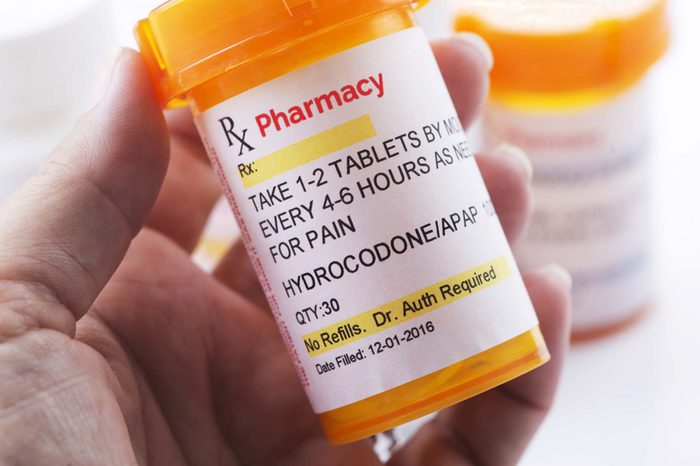There’s a common drug problem, especially among the elderly: Polypharmacy, or over-prescribing. This refers to too many older Americans taking too many unnecessary prescription drugs given by doctors for various reasons. In a 2015 study, published in The Journals of Gerontology Series A: Biological Sciences and Medical Sciences, researchers found among people ages 65 to 69, 25 percent take at least five prescription medications to chronic conditions.
Read on to learn more about polypharmacy and the risks of taking too many medications.

Over-prescribing is on the rise
Polypharmacy has become a big problem, particularly among older adults. “There are many factors contributing to the high rates of polypharmacy we’re seeing, including patients living longer, more medicines coming on the market, and our fragmented health system, where care is often uncoordinated,” says Caleb Alexander, MD, co-director of the Johns Hopkins Center for Drug Safety and Effectiveness in Baltimore. “Prescription medicines serve an invaluable role in the treatment of many diseases, but millions of Americans are on medicines they may no longer need.”
Gary L. LeRoy, MD, a family physician in Dayton, Ohio, and a member of the board of the American Academy of Family Physicians, adds: “It’s stunning how much more of this I’m seeing. “I think electronic health records are helping us realize more patients are falling into polypharmacy, because instead of handwritten charts, we can now electronically follow people’s prescriptions.” Check out these 10 signs that you’re taking too many prescriptions.

Don’t forget vitamins and OTC medications
Over-prescribing is known as polypharmacy because it doesn’t just involve prescriptions; over-the-counter (OTC) drugs and supplements also contribute to the danger. “Back when I was a med student, Prilosec could only be prescribed by gastroenterologists; today you can buy it yourself. We now have many medications you can buy off the shelf that aren’t exactly harmless,” says Dr. LeRoy. “Even if it’s natural or herbal, it may have an ingredient that could adversely interact with a prescription.”
In fact, the vast majority of older adults taking prescriptions are also using OTC treatments, says Dr. Alexander, who co-authored a 2016 study on the subject in JAMA Internal Medicine. “In this paper, we found that 15 percent of older adults were at risk for major drug-to-drug interactions because of the combination of prescription medicines with over-the-counter medicines and dietary supplements,” he says. The types of non-prescription pills found to lead to troubles included omega-3 fish oil, aspirin, potassium, and garlic. Check out these 10 OTC medications that you’re using all wrong.

Beware the Rx cascade
If you take a sleeping pill prescribed by your doctor, and while on that, you have a procedure and the surgeon gives you a pain medication, and then you notice a rash and decide to take Benadryl. “Now you’re taking three things that suppress your ability to stay awake and breathe,” says Dr. LeRoy. “That’s a dangerous combination, and it’s only one example of possible interactions.”
Other combinations can cause reactions ranging from “confusion to life-threatening cardiac events and anything in between,” says Dr. Alexander. Then there’s the prescribing cascade, in which a bad reaction to one medication is viewed as a distinct medical issue that leads to another prescription, and so on. Call it “distraction complexity,” says Dr. Alexander. Make sure you know these 13 medication combinations you should completely avoid.

Getting older could mean fewer pills
There’s a common misconception that aging inevitably means more medications, but Dr. LeRoy says that isn’t always true. “Sometimes, things just get better,” he explains. “I’ll see patients who retire and stop worrying about work, and suddenly their hypertension improves and they sleep better, so I can reduce their blood pressure dosage or drop their sleeping pills. I recently had a patient say, ‘I finally started eating right and lost 20 pounds!’ His blood pressure looked [normal] and some of his gastrointestinal problems improved, so we could back off those medicines.” Hearing that their prescription regimens could be trimmed can motivate patients to live a healthier lifestyle, Dr. LeRoy adds. “It can help patients realize, ‘If I’m good we could get rid of some of these pills.’ And that reduction decreases the likelihood of drug-drug interactions.”

Watch for medication mistakes
Some patients have so many pill bottles prescribed by different doctors that they lose sight of what’s necessary. For example, Dr. LeRoy has seen patients daily swallowing medications that were prescribed to be taken “as needed.” He’s also seen patients prescribed a generic like omeprazole by a specialist who didn’t realize the patient was already taking Prilosec. “Those are generic and brand name versions of the same medication,” says Dr. LeRoy. “So the patient is doubling up and suffering side effects.” Learn about 17 additional medication mistakes to avoid that could be making you sick.

Let loved ones help out
In some cases, it’s not the patient, but their spouses or adult children who might be in the best position to catch signs of over-prescribing. “Start by noticing how many pill bottles are lying around the house,” says Dr. LeRoy. “Then do a two-minute quiz: ‘Mom, what is this medication for?’ or ‘Pops, when is the last time you took this?’ If you’re seeing 16 bottles sitting out, and the patient isn’t sure how many they take or when, that’s a big problem.” Loved ones can also provide crucial help by coming to appointments, adds Dr. LeRoy, in order to take notes and hear first-hand what the medications are for and how they should be taken. (Here are hidden dangers of OTC medications.)

Know when it’s time to call for help
“I think any patient who is concerned about whether or not they’re on too many medicines should raise this issue with their physician,” says Dr. Alexander, who also notes some specific circumstances that might prompt a patient to pick up the phone. Starting with being on five or more medications, or if you’re experiencing what you believe are adverse effects from a pill or a combination of pills. “It’s impossible to have too much communication between patients and providers about the treatments patients are taking,” Dr. Alexander adds.

Call the right doctor
Those myriad pill bottles may have different doctors listed as contacts, but stick with your primary care provider for your first call. “Although our healthcare system is quite fragmented, primary care physicians should serve as quarterbacks for their patients and help coordinate all the care they’re receiving,” Dr. Alexander says. “Primary care physicians are very well suited to try to minimize avoidable polypharmacy by making their patients’ prescription regimens as lean as possible.” Dr. LeRoy, a primary care physician himself, agrees. “Everyone needs a family physician who knows them personally,” he says. This relationship also helps the physician know which loved ones to involve in the patient’s care. “I’ll call the wife, the sister, or the brother—with my patient’s permission—to discuss these prescriptions and make sure everyone is on the same page.”

Talk with your doctor to lighten your Rx load
In order to sort through a confusing medication regimen, your doctor could schedule a “medication reconciliation” visit. “I’ve had patients bring in small carry on suitcases filled with pill bottles,” says Dr. LeRoy. “We line them up, discuss why they’re taking each one, and make sure there are no drug-to-drug interactions.” During such reviews, physicians can look for opportunities to whittle down the regimen to the essentials. “I’m a firm believer that less is better,” says Dr. LeRoy. This move is safe, suggests a 2016 study published in PLoS ONE, which concluded “deprescribing” among older adults had “no significant adverse effects on survival or other clinical outcomes.” Also discuss the effects of both continuing and discontinuing your medications.

Don’t stop medications based upon reading this
While it’s possible you may be able to reduce your pharmaceutical load, it’s up to your doctor to carefully review your drug regimen with you to determine whether—and how—to safely adjust your dosages. “Patients should be encouraged to raise any concerns they may have directly with their provider,” says Dr. Alexander.